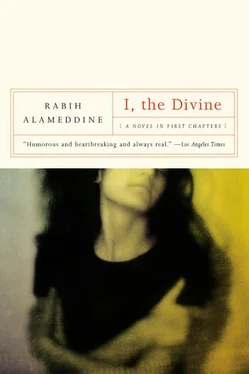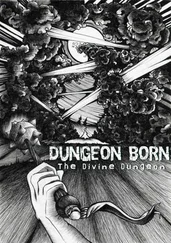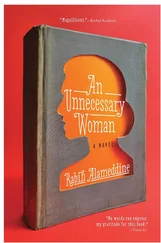“We kicked ass,” I said, regaining my voice.
They both laughed.
5.
Starbucks on Hamra Street looks like its counterparts in America, the faux-modernist murals, the pimply-faced teenagers behind the counter, the logoed coffee mugs. It is swamped, Beirut’s latest in place, to see and be seen, clamorous, the noise of chatter exceeded only by the ringing of cell phones. When Starbucks flung its gates open, Beirut’s elite returned to Hamra Street after an absence of more than twenty-five years. The Mercedeses and BMWs reappeared, cautiously claiming parking spaces that once belonged exclusively to them.
“One grande low-fat latte and one cappuccino for here,” the cashier announces. She writes something down on two cups and passes them to the boy working the espresso machine. The boy repeats the order earnestly, a diligent echo.
“How may I help you?” the cashier asks the woman in full-designer regalia, suit, pumps, jewelry, and sunglasses. The cashier speaks English with a horrible attempt at an American twang. The woman does not look at her, but at the floor.
“Where did you get these tiles?” the woman asks, in English with a Lebanese accent. She holds her Prada handbag, brown with clear plastic handles, close to her. The woman repeats the question, deliberately, as if talking to someone mentally handicapped, still not looking at the girl. The girl looks at her co-cashier, who shrugs her shoulder. The espresso boy arches his eyebrows.
“She’s asking about the floor,” Amal says in Arabic. Both woman and girl stare at us.
6.
We sat on a hooker-green sofa, on the basement floor. Starbucks is large, covering over two floors as well as the sidewalk. Multiple rooms and sections surround a huge fireplace.
“Why do you let him get to you?” Amal asked between sips of coffee. Everything about her appearance whispered comfort. Her clothes were elegant, yet unthreatening, a dark cream dress and a burnt-sienna sweater. Her black hair was braided and pinned. Unobtrusive makeup on a soft face, her eyes tender. None of the stress of my father’s hospitalization seemed to have affected her.
“I don’t know, but I’m getting better. Now it takes me about five minutes to revert to being a little girl. It used to be instantaneous. I’m constantly torn between trying to please him and wanting to hurt him. I’m going to be forty in a few months and he still treats me like a child.”
“It’s because he doesn’t see you that often. If you lived here, he’d get tired of it.” She chuckled. “At least he’ll stop asking you to move back. He used to get on my case all the time, but he doesn’t much these days. I miss that.”
I moved my coffee cup back, as if to throw it at her. She pretended to duck, laughing.
“He loves you,” she added. “He wants you near him. We all do.”
“I can’t move back for many reasons,” I said, slightly unsettled. I hated having to repeatedly enunciate my reasons for not wanting to live in Beirut.
“Name one.”
“Okay, you know what I hate? I hate the fact that in all of Lebanon, one can’t find a box of tissues that dispenses one tissue at a time. No matter what brand I get, I always have to pull three or four at a time to get one. Doesn’t that bug you?”
“Get serious.”
“Here’s another. Last time I was here, Omar took me to his gym. It was so luxurious. They had the newest machines but no one really used them. Everybody used the Jacuzzi and that was it. But my god, what a Jacuzzi! It can fit a hundred people easily. It had fountains in the middle. There’s a bed in the damn Jacuzzi. Twenty people can lie on it. No joke.”
“What has that got to do with anything?”
“This country is just appearances.”
“And America isn’t?”
“Yes,” I said, unable to control my grin, “but in America, tissue boxes dispense one tissue at a time.”
She giggled. “You’re terrible. You keep saying that as a family we don’t talk, that we try to bury our problems, yet every time I try to talk to you, you start making jokes and really bad ones too. You no longer have any good reasons for staying in America, do you?”
“My life is there. I have nothing here anymore.”
She smirked. “And fuck you too.”
“You know what I mean.”
“No, I don’t really. We’d love to have you here. I need you. Your son needs you.”
“Beirut holds terrible memories for me,” I said slowly, measured.
“Stand in line. Come back and deal with them.”
“Can we talk about this some other time? I just arrived. I promise I’ll think about it and we’ll talk another time.”
“Okay, I’ll hold you to that.” She took another sip of coffee. “And you’re wrong. There are many tissue boxes that dispense just one. You’re just getting the cheap brands.” She smiled mischievously.
“Come here,” she said. She reached over, hugged me. “Welcome back,” she whispered in my ear. She kept holding me close. I squeezed her tighter, swallowed by her warmth, my shoulders relaxing. I felt caffeinated faces registering our inappropriate behavior. Across the room, the eyes of a framed Latino coffee-picker smiled at me. I smiled feebly back at him. Next to the photo was another of a red cup filled with black coffee on a yellow-and-blue plaid table cover.
7.
My father, who had an unhealthy addiction to Chuck Norris’s Walker, Texas Ranger , lay in bed staring up at the television. Majida and Saniya watched the episode, but I could not. I was able to tune out the dialogue but could not do the same with the show’s music.
My father had black, expressive eyes that wore a look of reproach as if I had committed an inexpiable sin, accusing me, not of something, but of everything. When I was younger, they were magical eyes, frightening, brimming with both promise and menace, both anxiety and wonder. They shone with an intoxicating, mesmerizing energy that both repelled and attracted me.
In the cheerless hospital room, as he watched Texas Ranger , I saw his distracted eyes, still beautiful, no longer threatening, neither dangerous, nor auspicious.
8.
“Pizza Hut delivers,” my half-sister, Majida, said. “Or we can have Chinese. I’m up for anything.”
“Why don’t you girls go home?” Saniya stood up and stretched. “We’re doing fine here.” She took my father’s gray-blue food tray and placed it outside the room. On the tall nightstand beside my father’s bed were two oranges, a red apple, an off-white phone, a box of tissues, a plastic bottle, and a half-full glass of water.
“I want to see the end of the show,” Majida said.
My father’s breathing was flabby and shallow, with a slight gurgling sound like the soft hookah aspiration of a young boy. “At least until the fight,” he said. Walker always ended with Chuck Norris and his black sidekick beating up on the bad guys, followed by commercials, and then the final joke, where the regulars of the show convened to shoot the breeze. My father watched the fight, but turned the television off before the joke, which he never found funny.
“Why don’t you go home?” I said, looking at Saniya. “I’ll spend the night. You take a break.” Both my parents looked at me quizzically, as if I had spoken in Latin. “I’m serious. I’d like to stay here for the night. You go home and rest.”
“He’s being discharged tomorrow,” Saniya said. “We can all sleep in our own beds then. You go home and see your son.”
“Be quiet, both of you,” my father snapped. He turned the volume up with the remote control; his hand had a slight tremor. Chuck and chum punched, kicked, and karate-chopped six bad guys, cowboy hats burst in every direction.
9.
Читать дальше












